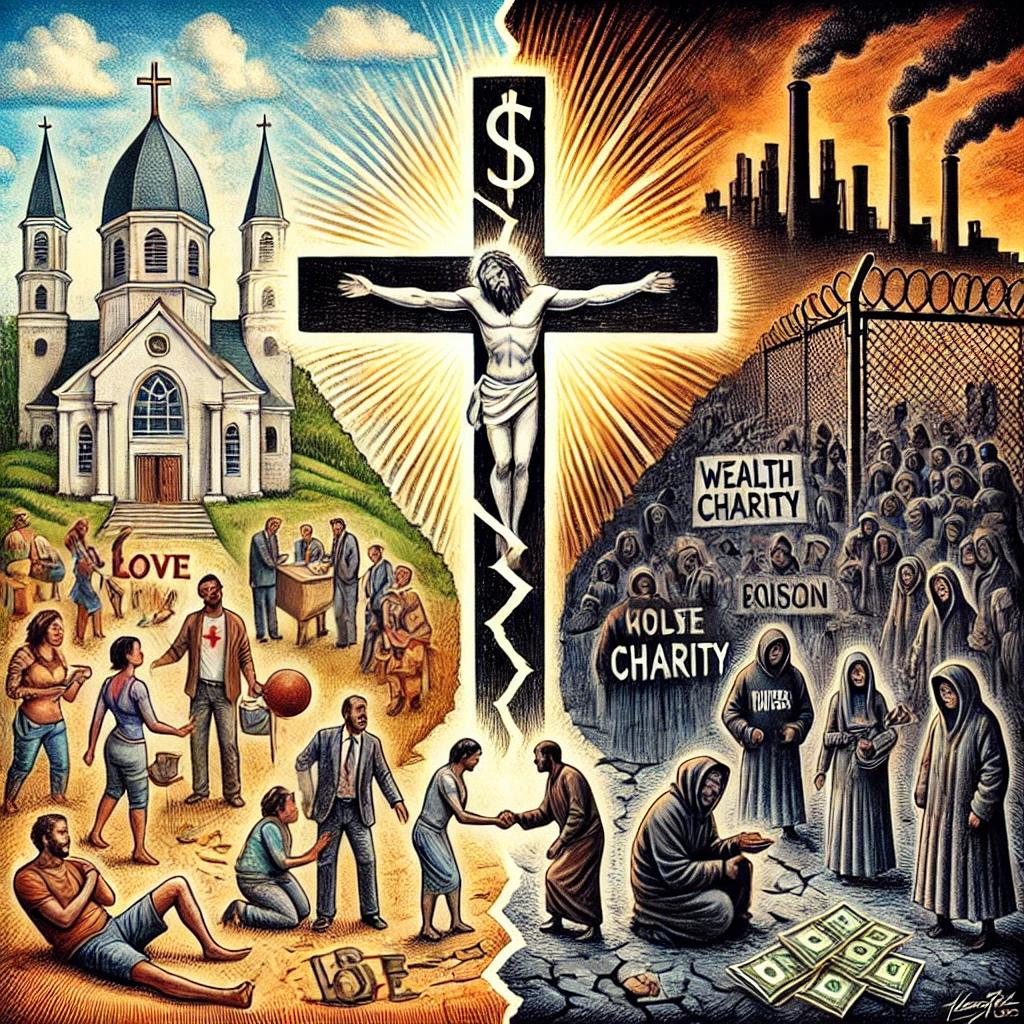Christianity teaches love as a central principle, urging compassion and kindness toward others. It emphasizes caring for the poor, sick, and marginalized, reflecting Christ’s actions and teachings. This care extends to forgiveness, encouraging individuals to let go of resentment and seek reconciliation. Christianity values humility, promoting the idea that serving others is noble and virtuous. It speaks to the inherent dignity of every person, affirming that all are created in God’s image and worthy of respect. Is America really Christian?
Christianity also calls for hope in the face of adversity. It inspires faith in the possibility of redemption and renewal, no matter how dire circumstances may seem. Through its teachings, it fosters a sense of shared responsibility, urging people to bear one another’s burdens. The belief in a loving God provides comfort and strength, particularly in moments of despair. This vision of love, charity, and hope encourages a life dedicated to bettering oneself and the world.
I wouldn’t write this article because people’s faults are blamed—well—on the very people themselves. But fanatics claim they uphold Christian values in the USA. So is America really Christian? No way!
How should Christian act and he doesn’t act
Common moral faults often stand in sharp contrast to the ideals associated with American Christian values, such as honesty, charity, humility, and community. Dishonesty, a widespread human failing, conflicts with the Christian emphasis on truthfulness and integrity. While many in the U.S. promote Christian values as a foundation for trust and ethical behavior, the prevalence of lies for personal or political gain highlights a gap between ideals and practice. This dissonance is evident in everyday interactions and public life, where falsehoods often overshadow a commitment to truth.
Greed also starkly contrasts with the American Christian ideal of charity and generosity. While Christianity encourages helping the less fortunate and sharing blessings, greed drives economic inequality and exploitation. This is particularly evident in a culture that celebrates wealth accumulation, even when it comes at the expense of others. The pursuit of material success can eclipse the moral call to uplift those in need, revealing a tension between professed values and societal behaviors.
Far from Christian ideals
Pride and arrogance, seen in self-centered or dismissive attitudes, diverge from Christian teachings of humility and service to others. While humility is often championed as a core value, the tendency toward self-promotion and ego-driven actions frequently undermines this principle. Gossip, a seemingly minor but destructive fault, conflicts with the call to love one’s neighbor and foster harmony. In a society shaped by Christian values, the persistence of gossip reflects the struggle to align behavior with ideals of kindness and respect.
Selfishness, too, runs counter to the communal ethos often associated with American Christianity. The emphasis on individualism in American culture sometimes undermines the Christian ideal of selflessness and mutual support. Similarly, neglect of responsibilities, whether personal or communal, clashes with the Christian call to stewardship and accountability. Envy, which breeds resentment of others’ success, opposes the Christian virtue of contentment and gratitude. These moral shortcomings reveal a recurring tension between the values often professed in American Christian discourse and the realities of human behavior, underscoring the need for ongoing reflection and commitment to living those values authentically. America is Christian only on paper.
X (former Twitter) is, well, Un-American
I have been sworn at and insulted on X, the platform formerly known as Twitter, by individuals quick to abandon decency in favor of hostility. Their words often carry venom, aimed not at understanding or resolving differences but at silencing or degrading others. This behavior stands in stark opposition to Christian values that call for kindness, humility, and the love of one’s neighbor. Swearing, name-calling, and personal attacks reveal a disregard for the dignity of others—a fundamental tenet of Christian teachings. Instead of fostering constructive dialogue, these individuals indulge in aggression, exposing a profound disconnect between their actions and the moral principles they might otherwise claim to uphold. Is America really Christian?
Such conduct also unravels a deeper truth about those who engage in it. In their eagerness to demean others, they reveal their own shortcomings, showcasing anger, pride, and a lack of empathy. Christianity teaches that words should build others up, yet these actions reflect a willful rejection of that ideal. The anonymity and detachment of the platform seem to embolden this behavior, stripping away accountability and amplifying cruelty. Their insults are not just a betrayal of Christian values but a reflection of inner struggles, demonstrating how far they have strayed from the compassion and grace central to their professed beliefs.
Is America really Christian? Fake behavior and evolutionary psychology
People often retain their evolutionary psychology-driven personalities beneath the surface, even when projecting a different image outwardly. Evolutionary psychology explains that traits like competitiveness, dominance, or tribal loyalty are deeply ingrained, shaped by millennia of survival and reproduction pressures. These instincts persist, influencing behavior even in modern contexts where social norms demand restraint or conformity. For example, someone may outwardly appear cooperative and agreeable but internally assess situations in terms of competition or status, masking their true priorities to fit societal expectations.
This outward “fakeness” serves as a survival mechanism, allowing individuals to navigate complex social environments. Social norms often pressure people to appear kind, humble, or selfless, even when their instincts lean toward self-interest or territoriality. A person may feign politeness while harboring resentment or act altruistic in public while prioritizing personal gain in private. This duality highlights the tension between evolutionary drives and the constructed morality of society. It reveals how much of human interaction is a performance designed to reconcile primal instincts with social expectations, allowing people to thrive while keeping their deeper impulses hidden.
From petty theft to murder. A Christian nation

The judiciary and penitentiary system in the United States reveals a profound contradiction within a society largely identifying as Christian. American Christians commit the crimes and American Christians want the harshest punishments. For minor offenses like loitering, trespassing, or petty theft, individuals are subjected to harsh penalties that disproportionately affect the vulnerable. These punishments are not imposed by an abstract system. They are upheld by the choices of voters, lawmakers, and enforcers who call themselves Christians. The faith that teaches forgiveness and second chances is set aside in favor of retribution, often for the pettiest infractions. Instead of mercy, people allow or even demand policies that destroy lives for small mistakes. This shows that their professed Christianity does not extend to their actions.
Perpetuate cycles of poverty as a Christian solution
Nonviolent crimes, particularly drug offenses, further expose this failure. Thousands are incarcerated for possession or minor distribution, often facing long sentences that tear families apart and perpetuate cycles of poverty. Christianity teaches addressing the root causes of such problems—despair, addiction, and lack of opportunity. But these same Christians choose punishment over rehabilitation. They vote for mandatory minimums, support cash bail systems, and remain silent in the face of injustice, despite the clear contradiction to their faith. They are the ones ensuring the continuation of a system that values vengeance over healing, showing a failure to embody the grace and compassion central to their religion.
Murderers as Christians
America is Christian even when it comes to the harshest crimes. For the gravest crimes, such as violent assaults, murder, or organized crime, the hypocrisy reaches its peak. Not only do Christians commit those crimes, but they also advocate for draconian punishments. Christianity teaches even the worst sinners can repent. Yet many Christians champion life sentences and capital punishment, effectively denying the possibility of redemption. These are not abstract decisions—they are made by juries, legislators, and citizens who claim to follow Christ.
The push for punishment over restoration mirrors the very violence they claim to condemn. Instead of working to create systems that heal both victims and offenders, they demand systems that lock people away forever or take their lives outright. This is not just a failure of the system. It is a failure of the Christians who shape it. They have abandoned the core teachings of mercy, forgiveness, and love, choosing judgment and fear instead. The fault lies with them, and they cannot claim their faith while acting against it.
Jesus wouldn’t be a neoliberal
Jesus Christ wouldn’t align with neoliberal ideals because his teachings and actions fundamentally contradict its principles. Neoliberalism emphasizes individualism, competition, and market-driven priorities, whereas Christ’s message focused on community, compassion, and care for the marginalized. He rejected the pursuit of wealth at the expense of others, teaching that “blessed are the poor” and cautioning against greed, saying it’s harder for a rich man to enter heaven than for a camel to pass through the eye of a needle. Rather than celebrating unregulated markets or austerity policies, Christ would advocate for sharing resources selflessly, uplifting the oppressed, and prioritizing the needs of the vulnerable—values incompatible with neoliberal thinking.
If Jesus lived in today’s world, he would challenge the structural inequalities exacerbated by neoliberal policies. He would confront corporations exploiting workers and critique governments that prioritize profit over human dignity. Instead of applauding vast personal wealth, he would call for its redistribution to support the less fortunate, embodying the principle of loving one’s neighbor. His parables and teachings about fairness and generosity—such as the story of the Good Samaritan—demonstrate his emphasis on collective responsibility over self-interest. Christ’s vision of justice, compassion, and humility stands in stark contrast to the transactional and competitive focus of neoliberalism.
Welcome to Homo sapiens’ land! No religion can change it
Homo sapiens, shaped by millions of years of evolution, carry traits that reflect both remarkable adaptability and deeply ingrained flaws. From an evolutionary biology perspective, humans are inherently self-preserving, prioritizing survival and reproduction above all else. This instinct drives behaviors like selfishness, territoriality, and competition. In ancient times, these traits ensured survival in harsh environment, but in modern society, they often manifest as greed, conflict, and exploitation. Tribalism, another evolutionary holdover, makes humans naturally inclined to form in-groups and out-groups. While it fostered cooperation within small bands of early humans, it now fuels racism, xenophobia, and societal divisions. All of it goes against Christianity.
Evolutionary psychology further reveals the challenges of the human mind, which is wired to react to threats—real or perceived—with fear, aggression, or avoidance. This fight-or-flight response, essential for early humans facing predators, now contributes to anxiety, impulsive decision-making, and irrational behavior. Humans are also prone to cognitive biases, such as confirmation bias and overconfidence. Those hinder critical thinking and reinforce flawed beliefs. Sexual selection, another evolutionary force, drives behaviors like status-seeking, infidelity, and risk-taking, often at the expense of long-term stability or morality. No religion or philosophy can completely overwrite these deeply rooted tendencies. They are not products of culture or belief but of biology and psychology, embedded in the very fabric of what it means to be human. And Christianity cannot change it.
More secular, more moral

Research consistently shows that the more secular a society or individual becomes, the less likely they are to commit crimes. Secular individuals often rely on reason, empathy, and social contracts to guide their behavior rather than adhering to external moral absolutes. This focus on personal responsibility and accountability fosters ethical decision-making that aligns with societal well-being. In the United States, data from the Federal Bureau of Prisons highlights this trend: atheists, who make up a small percentage of the population, are vastly underrepresented in the prison system. In one survey, only 0.02% of inmates identified as atheists, even though around 2.4% of the general U.S. population identified as non-religious at the time. This disparity suggests that individuals without religious affiliation are significantly less likely to engage in behaviors that lead to incarceration.
Globally, this pattern is reflected in secular societies, such as those in Scandinavia, which report some of the lowest crime rates. These nations emphasize education, critical thinking, and robust social safety nets. This creates environments where criminal behavior is less likely to arise. In contrast, more religious societies often exhibit higher crime rates and harsher punitive attitudes toward offenders. This raises questions about the effectiveness of religious morality in deterring crime. Moreover, rigid religious frameworks can sometimes justify harmful actions, while secular individuals approach ethical dilemmas through the lens of shared humanity and practical consequences. These findings challenge the assumption that religiosity inherently promotes moral behavior and suggest that secularism, by fostering rational, empathetic, and fair-minded approaches, plays a crucial role in reducing crime and creating more ethical societies.
Conclusion
The question “Is America really Christian?” finds its answer in the glaring contradictions between the nation’s professed faith and its societal realities. Christianity calls for caring for the sick, the poor, and the vulnerable. Yet countless Americans die every year due to lack of access to healthcare. This neglect is not a failure of an abstract system but a choice made by individuals who claim to uphold Christian values while voting against universal healthcare or supporting policies that prioritize profit over human life. Stunning inequality in the U.S. further underscores this hypocrisy. While millions live in poverty, struggling to afford basic needs, others (and I mean regular people, not the super-rich) amass unimaginable wealth. This disparity reflects a society more focused on materialism and self-interest than on the Christian principles of charity and justice.
The hypocrisy is most glaring in the criminal justice system, where Christians advocate for policies that destroy other Christian lives, perpetuate poverty, and deny redemption. Instead of embodying Christ’s mercy, many choose judgment and fear, reinforcing cycles of poverty and incarceration. Meanwhile, systemic failures in healthcare and economic equity reveal an unwillingness to bear one another’s burdens, as Christianity teaches.
Secular societies and individuals, in contrast, often demonstrate that morality, fairness, and compassion can thrive without religious justification. Evolutionary psychology explains human flaws, but it also shows how reason and empathy can guide us beyond them. America’s failure to live up to its Christian ideals is not a failure of Christianity itself but of the people who claim it while acting against it. Their faith, as it stands, is a hollow echo of what it could be—a faith that turns away from the suffering of others while claiming to follow Christ.

Leave a Reply